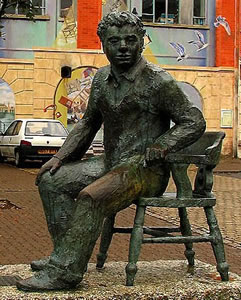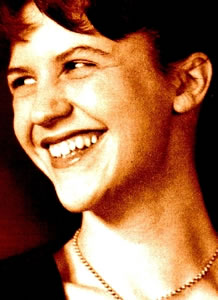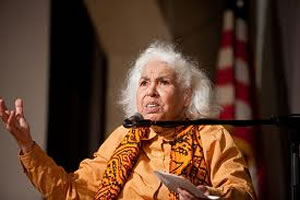|
De Engelse dichter Dylan Thomas werd geboren op 27 oktober 1914 in Swansea in Wales. Zie ook mijn blog van 27 oktober 2006 en ook mijn blog van 27 oktober 2007 en ook mijn blog van 27 oktober 2008 en ook mijn blog van 27 oktober 2009.xml:namespace prefix = o ns = "urn:schemas-microsoft-com:office:office" />
Uit: A Child's Christmas in Wales
One Christmas was so much like another, in those years around the sea-town corner now and out of all sound except the distant speaking of the voices I sometimes hear a moment before sleep, that I can never remember whether it snowed for six days and six nights when I was twelve or whether it snowed for twelve days and twelve nights when I was six.
All the Christmases roll down toward the two-tongued sea, like a cold and headlong moon bundling down the sky that was our street; and they stop at the rim of the ice-edged fish-freezing waves, and I plunge my hands in the snow and bring out whatever I can find. In goes my hand into that wool-white bell-tongued ball of holidays resting at the rim of the carol-singing sea, and out come Mrs. Prothero and the firemen.
It was on the afternoon of the Christmas Eve, and I was in Mrs. Prothero's garden, waiting for cats, with her son Jim. It was snowing. It was always snowing at Christmas. December, in my memory, is white as Lapland, though there were no reindeers. But there were cats. Patient, cold and callous, our hands wrapped in socks, we waited to snowball the cats. Sleek and long as jaguars and horrible-whiskered, spitting and snarling, they would slink and sidle over the white back-garden walls, and the lynx-eyed hunters, Jim and I, fur-capped and moccasined trappers from Hudson Bay, off Mumbles Road, would hurl our deadly snowballs at the green of their eyes. The wise cats never appeared.
We were so still, Eskimo-footed arctic marksmen in the muffling silence of the eternal snows - eternal, ever since Wednesday - that we never heard Mrs. Prothero's first cry from her igloo at the bottom of the garden. Or, if we heard it at all, it was, to us, like the far-off challenge of our enemy and prey, the neighbor's polar cat. But soon the voice grew louder.
"Fire!" cried Mrs. Prothero, and she beat the dinner-gong.

Dylan Thomas (27 oktober 1914 9 november 1953)
Standbeeld in Swansea Marine
De Amerikaanse dichteres en schrijfster Sylvia Plath werd geboren op 27 oktober 1932 in Jamaica Plain, een buitenwijk van Boston. Zie ook mijn blog van 27 oktober 2006 en ook mijn blog van 27 oktober 2008 ook mijn blog van 27 oktober 2009.
Child
Your clear eye is the one absolutely beautiful thing.
I want to fill it with color and ducks,
The zoo of the new
Whose names you meditate ---
April snowdrop, Indian pipe,
Little
Stalk without wrinkle,
Pool in which images
Should be grand and classical
Not this troublous
Wringing of hands, this dark
Ceiling without a star.
Sonnet : To Eva
All right, let's say you could take a skull and break it
The way you'd crack a clock; you'd crush the bone
Between steel palms of inclination, take it,
Observing the wreck of metal and rare stone.
This was a woman : her loves and stratagems
Betrayed in mute geometry of broken
Cogs and disks, inane mechanic whims,
And idle coils of jargon yet unspoken.
Not man nor demigod could put together
The scraps of rusted reverie, the wheels
Of notched tin platitudes concerning weather,
Perfume, politics, and fixed ideals.
The idiot bird leaps up and drunken leans
To chirp the hour in lunatic thirteens.
Wintering
This is the easy time, there is nothing doing.
I have whirled the midwife's extractor,
I have my honey,
Six jars of it,
Six cat's eyes in the wine cellar,
Wintering in a dark without window
At the heart of the house
Next to the last tenant's rancid jam
and the bottles of empty glitters--
Sir So-and-so's gin.
This is the room I have never been in
This is the room I could never breathe in.
The black bunched in there like a bat,
No light
But the torch and its faint
Chinese yellow on appalling objects--
Black asininity. Decay.
Possession.
It is they who own me.
Neither cruel nor indifferent,
Only ignorant.
This is the time of hanging on for the bees--the bees
So slow I hardly know them,
Filing like soldiers
To the syrup tin
To make up for the honey I've taken.
Tate and Lyle keeps them going,
The refined snow.
It is Tate and Lyle they live on, instead of flowers.
They take it. The cold sets in.
Now they ball in a mass,
Black
Mind against all that white.
The smile of the snow is white.
It spreads itself out, a mile-long body of Meissen,
Into which, on warm days,
They can only carry their dead.
The bees are all women,
Maids and the long royal lady.
They have got rid of the men,
The blunt, clumsy stumblers, the boors.
Winter is for women--
The woman, still at her knitting,
At the cradle of Spanis walnut,
Her body a bulb in the cold and too dumb to think.
Will the hive survive, will the gladiolas
Succeed in banking their fires
To enter another year?
What will they taste of, the Christmas roses?
The bees are flying. They taste the spring.

Sylvia Plath (27 oktober 1932 11 februari 1963)
De Egyptische schrijfster, gynaecologe, moslimfeministe en politiek activiste Nawal el Saadawi werd geboren in Kafr Tahla op 27 oktober 1931. Zie ook mijn blog van 27 oktober 2008 en ook mijn blog van 27 oktober 2009.
Uit: Woman at Point Zero
A little boy called Mohammadain used to pinch me under water and follow me into the small shelter made of maize stalks. He would make me lie down beneath a pile of straw, and lift up my galabeya. We played at bride and bridegroom. From some part of my body, where, exactly I did not know, would come a sensation of sharp pleasure. Later I would close my eyes and feel with my hand for the exact spot. The moment I touched it, I would realize that I had felt the sensation before. Then we would start to play again until the sun went down, and we could hear his fathers voice calling to him from the neighbouring field.
(
)
To knead the dough, I squatted on the ground with the trough between my legs. At regular intervals I lifted the elastic mass up into the air and let it fall back into the trough. The heat of the oven was full on my face, singeing the edges of my hair. My galabeya often slipped up my thighs, but I paid no attention until the moment when I would glimpse my uncles hand moving slowly from behind the book he was reading to touch my leg. The next moment I could feel it travelling up my thigh with a cautious, stealthy, trembling movement. Every time there was the sound of a footstep at the entrance to our house, his hand would withdraw quickly. But whenever everything around us lapsed into silence, broken only every now and then by the snap of dry twigs between my fingers as I fed the oven, and the sound of his regular breathing reaching me from behind the book so that I could not tell whether he was snoring quietly in his sleep or wide awake and panting, his hand could continue to press against my thigh with a grasping, almost brutal insistence.

Nawal el Saadawi (Kafr Tahla, 27 oktober 1931)
Zie voor nog meer schrijvers van de 27e oktober ook mijn vorige blog van vandaag.
|



